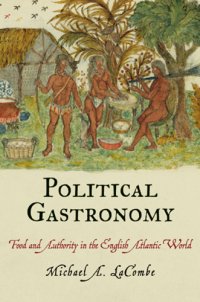
Ebook: Political gastronomy: food and authority in the English Atlantic world
Author: LaCombe Michael A
- Tags: British colonies, Colonists--Attitudes, Colonists--North America--Attitudes, Food--Political aspects--North America--History, Indians of North America--First contact with Europeans, Indians of North America--Food--Political aspects, Social conditions, History, Food -- Political aspects -- North America -- History, Colonists -- North America -- Attitudes, Indians of North America -- Food -- Political aspects, Indians of North America -- First contact with Europeans, North America -- History -- Colonial perio
- Series: Early American studies
- Year: 2012
- Publisher: University of Pennsylvania Press
- City: America;Great Britain;North America;Philadelphia
- Edition: 1. ed
- Language: English
- epub
"The table constitutes a kind of tie between the bargainer and the bargained-with, and makes the diners more willing to receive certain impressions, to submit to certain influences: from this is born political gastronomy. Meals have become a means of governing, and the fate of whole peoples is decided at a banquet."—Jean Anthèlme Brillat-Savarin, The Physiology of Taste, or, Meditations on Transcendental Gastronomy
The first Thanksgiving at Plymouth in 1621 was a powerfully symbolic event and not merely the pageant of abundance that we still reenact today. In these early encounters between Indians and English in North America, food was also symbolic of power: the venison brought to Plymouth by the Indians, for example, was resonant of both masculine skill with weapons and the status of the men who offered it. These meanings were clearly understood by Plymouth's leaders, however weak they appeared in comparison.
Political Gastronomy...